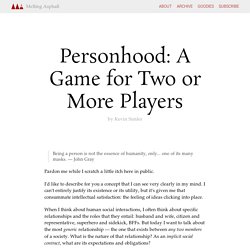

Is The Resilience Of Millennials Underrated? Katherine Streeter for NPR I'm a member of Generation Y, or the millennial generation.

People like me were born in the '80s and early '90s. But I don't like to broadcast that fact. Millennials tend to get a bad rap. Journalists and commentators love ragging on us. These ideas have been coming up over and over again for almost a decade now. Then there's the Slate article from a couple of years ago, titled "Why Millennials Can't Grow Up. " And now we're starting to turn against ourselves.
My friend Jay and I recently had a good laugh as we read through these articles together. Still, I wondered: Could it be true? "I've definitely heard reports regarding increased levels of psychopathology among millennials," says Mitch Prinstein, a psychologist at the University of North Carolina at Chapel Hill. It's true that young adulthood can be a turbulent time — for folks from any generation, Prinstein says. There are better stats on suicide among young people. A Pattern Language. Alexander Christopher Notes on the Synthesis of Form. The Essence of Peopling. Sarah Perry is a contributing editor of Ribbonfarm.

Nouns for human beings – “people” or “person” – conjure in the mind a snapshot of the surface appearance of humans. Using nouns like “people” subtly encourages thinking about people as frozen in time, doing nothing in particular. “People” is an anchor for thinking about human bodies separate from their environment, from the buildings and streets and farms and parks that they build and use to go about their business. I prefer to think about “peopling” – the process of human beings going about their business, whatever that is. I take this usage from the 1971 movie Bedknobs & Broomsticks, in which the main characters visit a magical animal kingdom, where a sign warns them away: Much of the modern built environment seems to bear this message as well, presenting a hostile face to ordinary human activity, and preventing all but an impoverished subset of peopling from occurring at all.
What is at the center of it all? Gardens Need Walls: On Boundaries, Ritual, and Beauty. Sarah Perry is a contributing editor of Ribbonfarm.

This essay attempts to place ritual in the context of evolving complex systems, and to offer an explanation for why everything is so ugly and nobody seems to be able to do anything about it. On Boundaries and Their Permeability Boundaries are an inherent, universal feature of complex systems. Boundaries arise at all scales, defining the entities that they surround and protecting them from some kinds of outside intrusion. To be functional, boundaries must be permeable, allowing the entities to take energy and information from outside themselves.
Boundaries are structures that protect what is within them and allow their contents to solve smaller, more manageable design problems than would be possible in a perfectly interconnected system. Islands are surrounded by natural boundaries. Note that the moon, however, despite being separated from the continents of Earth by a significant boundary, is not teeming with unusual life. Word pollution. 71516. Personhood: A Game for Two or More Players. Being a person is not the essence of humanity, only... one of its many masks. — John Gray Pardon me while I scratch a little itch here in public.

I'd like to describe for you a concept that I can see very clearly in my mind. I can't entirely justify its existence or its utility, but it's given me that consummate intellectual satisfaction: the feeling of ideas clicking into place. When I think about human social interactions, I often think about specific relationships and the roles that they entail: husband and wife, citizen and representative, superhero and sidekick, BFFs. But today I want to talk about the most generic relationship — the one that exists between any two members of a society.
I think it makes sense to call this generic social contract "personhood," and those who abide by it "persons. " Bear with me now. So it's often said, "If you want to be treated like a lady, you have to act like a lady. " BaumeisterMasicampo2010PsychRev.